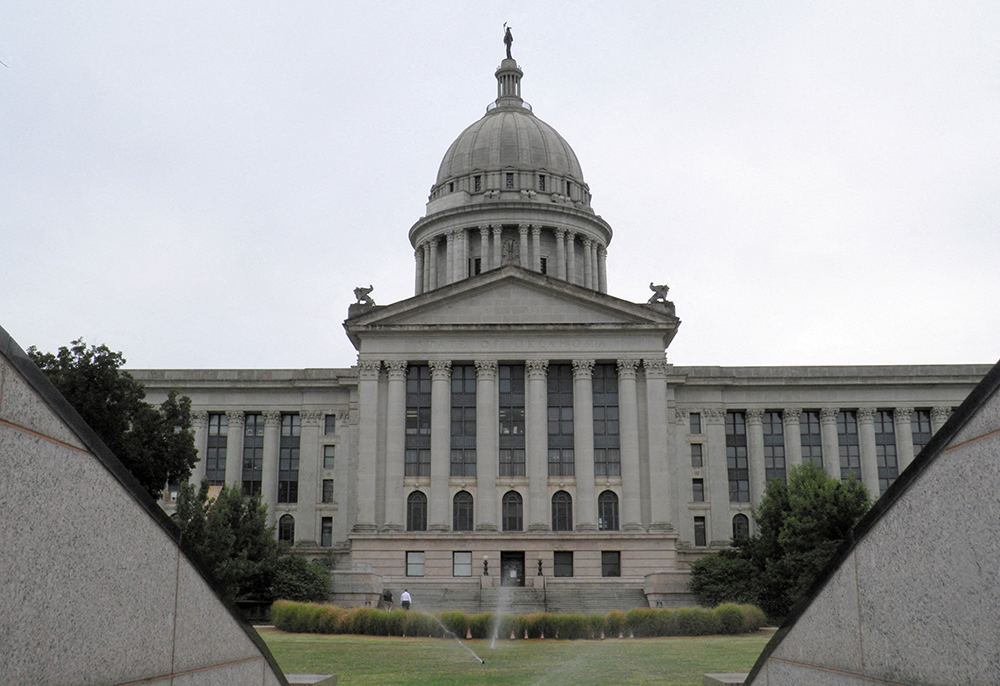
WASHINGTON — A state school board in Oklahoma voted Oct. 9 to approve a contract with a Catholic charter school set to open next school year, making it the nation’s first state-funded religious school.
Unless it is barred from opening by a court order, St. Isidore of Seville Catholic Virtual School, a free school for Oklahoma students in grades K-through-12, is expected to have an initial enrollment of 500 students, with the hope of increasing it to 1,500 students by 2028.
The Oklahoma Statewide Virtual Charter School Board voted 3-2 to approve a charter contract that sets terms for how the school will operate. Previously, charter schools’ contracts with the state’s school board have required that these schools be nonsectarian.
The school, created by the Archdiocese of Oklahoma City and the Diocese of Tulsa, is still in the middle of litigation. In July, a lawsuit was filed in Oklahoma County District Court seeking to prevent the state from sponsoring the school and to ensure it does not receive public funding. A judge has not ruled on this case.
Americans United for Separation of Church and State, the group leading the effort against the Catholic charter school, said in a statement after the state school board’s vote that their action was in “clear violation of Oklahoma law and the state’s promise of church-state separation and public schools that are open to all.”
The lawsuit against the school was filed after the state school board approved its application in June. The plaintiffs — represented by the American Civil Liberties Union, Americans United for the Separation of Church and State, the Education Law Center, and the Freedom from Religion Foundation — said that by allowing the school, the state would be forcing taxpayers to subsidize the Catholic Church’s mission of evangelization.
The Oklahoma State Department of Education filed a motion in September to dismiss the lawsuit. Ryan Walters, the state superintendent of public instruction, said in a statement that denying the church’s application was religious discrimination.
“Those who would sue to abridge the freedom of Americans to freely exercise their religion stand against 400 years of religious tolerance in America, predating the United States itself,” Walters said. “I will fight to protect the freedom of all Oklahomans enshrined in the U.S. Constitution and Oklahoma laws, especially in our schools,” he said.
The U.S. Supreme Court has established that religious schools could receive government funding from grants and school voucher programs, but it will take more litigation for courts to determine if a publicly funded school can promote a particular religion.
After the state school board approved the application for St. Isidore of Seville Virtual School in June, Brett Farley, the executive director of the Catholic Conference of Oklahoma, said he was elated. “Parents continue to demand more options for their kids, and we are committed to help provide them,” he added.
In March, he told The Tablet there would be mixed feelings no matter what the school board’s final decision would be, saying: “Folks will be cheering or jeering.”
And just as he predicted, both reactions were expressed.
In a statement just prior to the school board’s vote, Oklahoma Attorney General Gentner Drummond said approving the religious charter school would go against the state’s constitution and would not be “in the best interest of taxpayers.”
Oklahoma’s Republican Gov. Kevin Stitt called the vote “a win for religious liberty and education freedom.
“I am encouraged by these efforts to give parents more options when it comes to their child’s education,” he said in a statement, adding that the approval of the school’s application showed “that we will not stand for religious discrimination.”
St. Isidore of Seville Catholic Virtual School is named after the patron saint of the internet, for essentially creating an encyclopedia in the 600s. The idea for this school was first presented to state officials in 2021 and has been on a rocky road since with both support and pushback for it.
“It’s sort of a chess game,” Farley said this spring when he was unsure if the school would be approved. He said the application was on “unchartered waters,” and that no matter how the board voted on it there would likely be litigation.
The state charter board initially voted against approving the application in April but said it could be refiled after it addressed board members’ concerns.
Farley said the virtual Catholic charter school would “advance religious liberty and educational school choice at the same time” while fulfilling the Catholic Church’s mission to reach out where there are vast needs, especially in rural areas and for students with special needs.
The Oklahoma Catholic Conference thought the time was ripe for this application, he said, particularly after the Supreme Court’s Carson decision in 2022 where the justices said Maine’s exclusion of religious schools from a state tuition program for towns without public high schools violated the free exercise clause.
